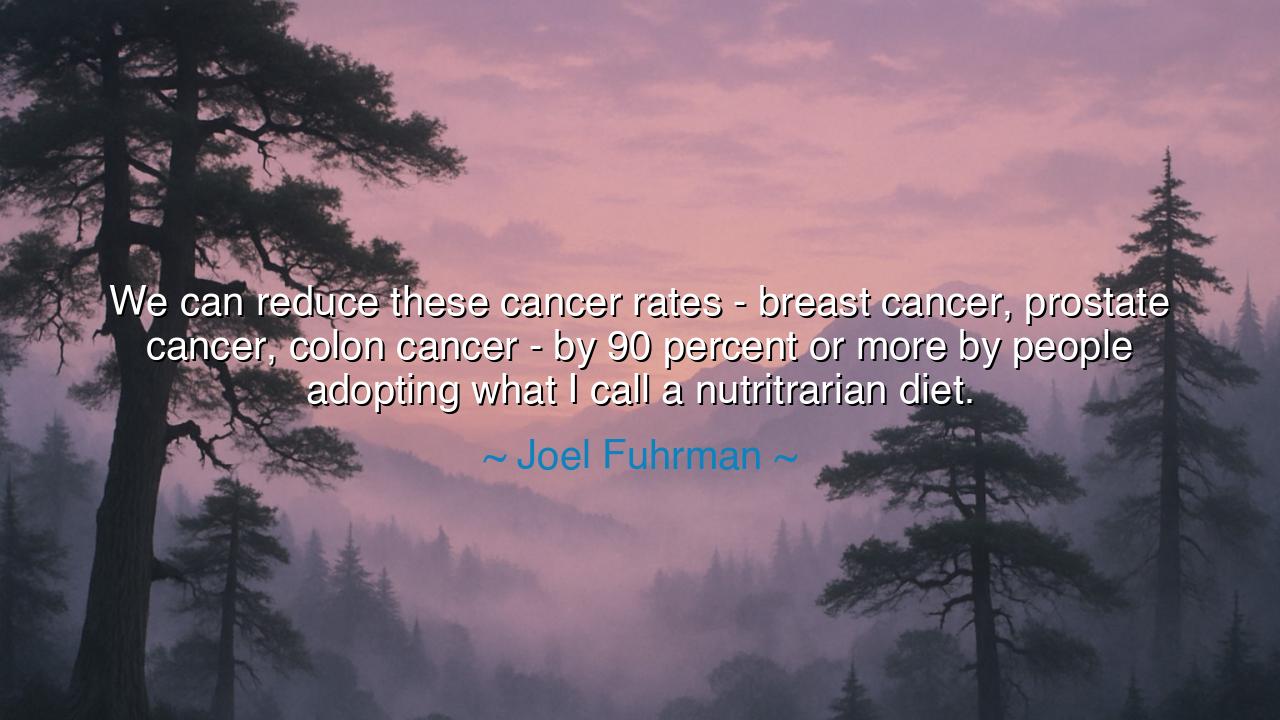
We can reduce these cancer rates - breast cancer, prostate
We can reduce these cancer rates - breast cancer, prostate cancer, colon cancer - by 90 percent or more by people adopting what I call a nutritrarian diet.






The physician Joel Fuhrman, a healer of both flesh and spirit, once proclaimed: “We can reduce these cancer rates — breast cancer, prostate cancer, colon cancer — by 90 percent or more by people adopting what I call a nutritarian diet.” In these words lies a truth both ancient and renewed: that the path to healing is not found in the apothecary’s bottle alone, but in the wisdom of nourishment — the art of eating with reverence for life. What Fuhrman calls “nutritarian” is no modern miracle, but a return to a sacred covenant with the earth — a remembrance that food is not merely pleasure or fuel, but the first and most faithful medicine.
The origin of his insight is rooted in both science and spirit. As a physician, Fuhrman studied the body’s mysterious mechanisms — the rise of disease in lands of plenty, the quiet decay beneath our modern abundance. But beneath the data, he saw a deeper malady: a world that had forgotten how to eat for life. He looked back upon the teachings of ancient healers — Hippocrates, who said, “Let food be thy medicine and medicine be thy food.” He saw that the wisdom of the past had been buried beneath convenience and indulgence. Thus he spoke of a new word — nutritarian, one who chooses foods not by taste or habit, but by their power to nourish the body’s innate design.
His message is both radical and humble: that we are not helpless before disease. That cancer, the terror of modern times, does not arise from fate alone but from the slow, silent rebellion of a body neglected. The nutritarian diet — rich in vegetables, fruits, seeds, legumes, and the gifts of nature’s garden — is not merely a diet, but a discipline of respect. It calls us to eat that which strengthens the blood, cleanses the cells, and awakens the body’s own power to defend itself. To follow it is to live in harmony with the very laws that sustain life — balance, simplicity, and renewal.
In the chronicles of the East, it is said that the Yellow Emperor, the ancient ruler of China, once asked his physician why the people of his time lived short and troubled lives. The physician replied, “They eat without understanding. They feast without gratitude. They sleep without rest. Thus their bodies decay while their spirits wander.” The Emperor, struck by this, decreed that all should learn the art of living in accordance with the rhythms of nature. Joel Fuhrman’s words, spoken thousands of years later, carry the same eternal truth: that when man separates himself from the wisdom of the earth, he invites illness; when he returns, health blossoms like spring from barren soil.
To speak of reducing cancer rates by ninety percent is not arrogance, but hope born of observation. For the body is not an enemy to be subdued — it is a miracle to be nurtured. Within each cell lies a will to live, to repair, to thrive. But it cannot do so when drowned in the toxins of modern consumption: processed foods, sugar-laden pleasures, and the lifeless meals of haste. The nutritarian path restores this harmony, not by adding more, but by removing what corrupts — stripping away the false riches of the table until only that which sustains remains.
There is a tale of a village in the mountains where disease was rare and longevity common. Travelers marveled at their strength and clarity of mind. Their secret was no elixir, no hidden herb — only a diet of simple grains, greens, and water drawn from the spring. They ate in silence, with gratitude, believing that every bite carried the spirit of life. But when traders brought them sugar and oil, when ease replaced effort, their bodies began to fail. What Fuhrman teaches is not new — it is the remembering of what those villagers forgot: that every act of eating is an act of choosing between vitality and decay.
The lesson, then, is clear and urgent. The modern world, in its brilliance, has lost its humility before the laws of nature. To heal ourselves, we must return to the temple of nourishment. Eat what grows, not what is made. Fill your plate with colors of the earth — greens of the field, reds of the vine, golds of the root. Drink water as if it were a prayer. In every meal, ask not “What do I crave?” but “What does my life need?” For this is the essence of the nutritarian way — to feed not just the tongue, but the soul that lives within the body.
So remember this, O children of abundance: the cure does not dwell in distant laboratories alone, but in the garden outside your door. Health is not the absence of sickness, but the presence of harmony. When we eat as nature intended, when we honor the life that sustains our own, we will not need to fight disease — for the body, guided by wisdom and nourished by love, will already have triumphed.






AAdministratorAdministrator
Welcome, honored guests. Please leave a comment, we will respond soon